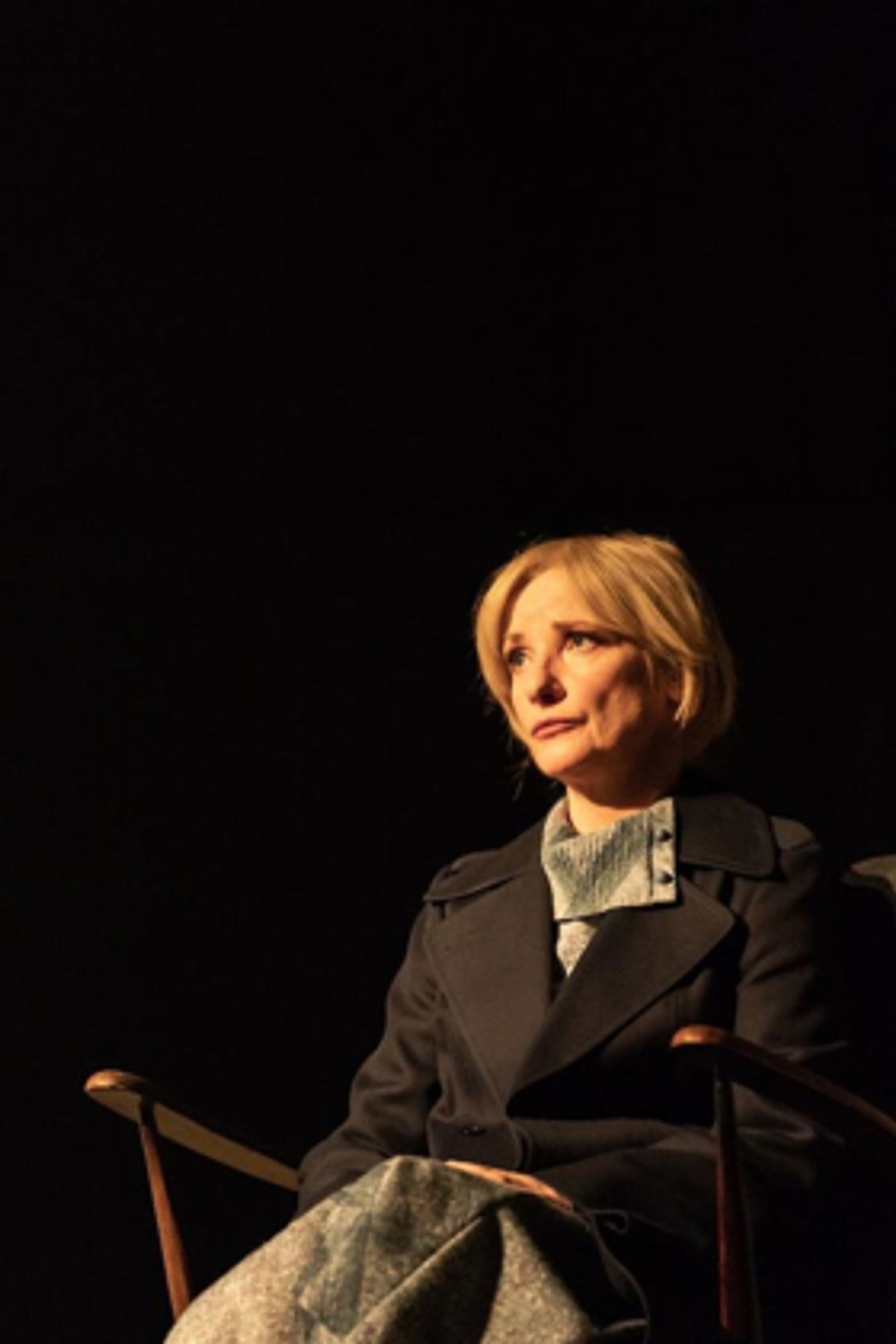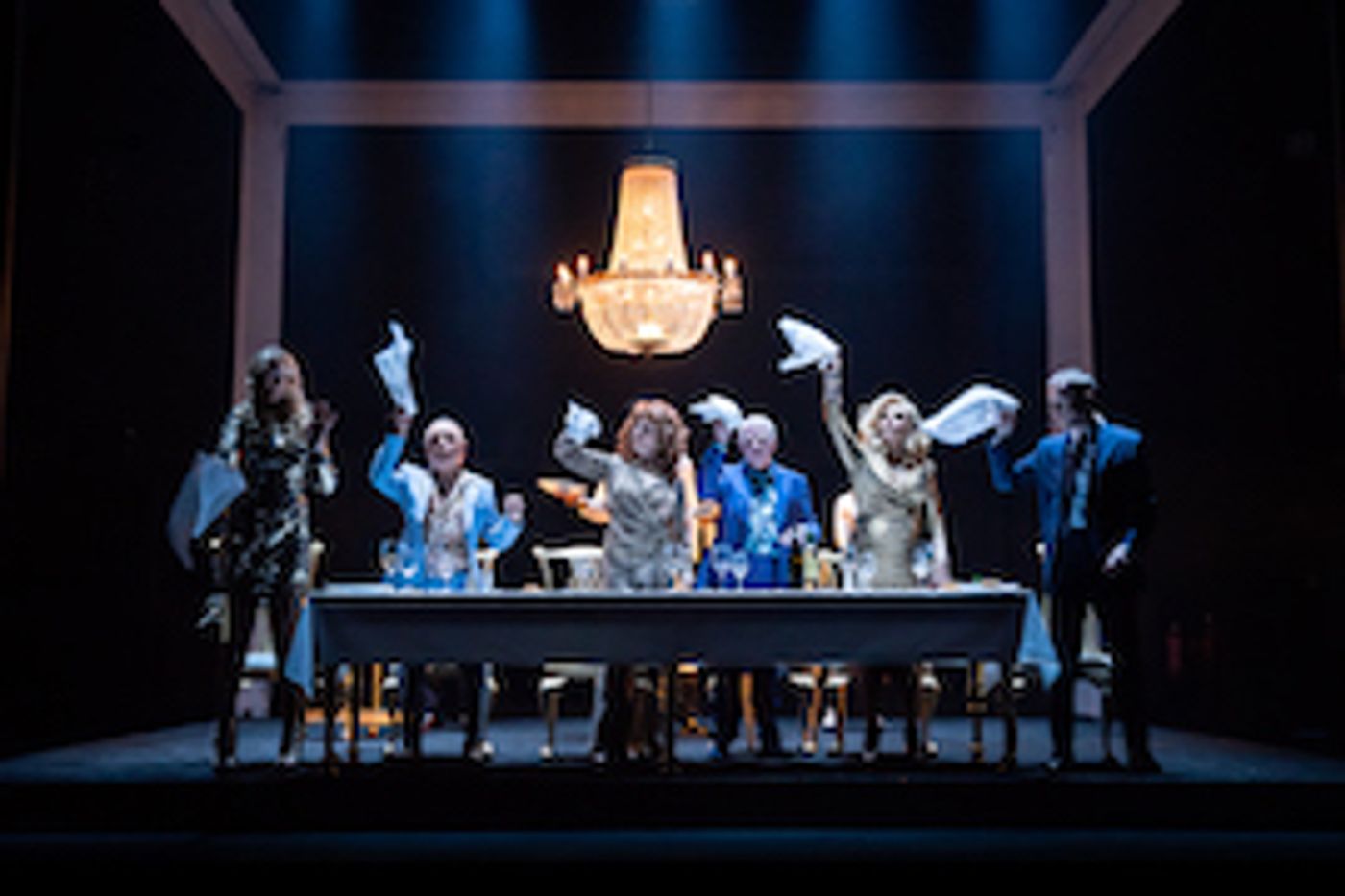Review: PINTER FIVE and PINTER SIX, Harold Pinter Theatre

Jamie Lloyd's star-studded season of short Pinter plays continues with two more intriguing productions: one directed by Patrick Marber, the other by Lloyd himself. Among the subjects this time around are family, miscommunication, class and politics - plus an early bid for the most memorable wigs of 2019.
Pinter Five (***) opens with the great man's first play: 1957's The Room. Anxious Rose Hudd maintains a one-sided conversation with her husband, fretting about the dangers of the outside world, their mysterious neighbours in the basement, and the perceived xenophobic threat to their possession of this boarding house room, alongside everyday natter about tea and the weather.
Though a grim, grey, claustrophobic bedsit with fogged-up windows (with milk and butter kept outside on the sill) in Soutra Gilmour's strong rendering, Jane Horrocks convinces utterly as Rose compares it with a terrifying alternative; "You've got a chance in a place like this", she asserts.
Visitors are ominous figures, invading this safe domestic space, from Nicholas Woodeson's blustering landlord, clanging ineffectually on the pipes with his wrench while sharing faulty reminiscences, to a bullying young couple (Emma Naomi and Luke Thallon) who declare the room is vacant, and finally Colin McFarlane's blind man, claiming to be from Rose's past.
Marber makes good use of the tight space to show how even a tiny action or seemingly innocuous phrase reverberates, and builds the piece patiently to its shocking conclusion - driven by Rupert Graves, excellent opposite a fidgeting, twittering Horrocks as the watchful, and eventually emphatic, Mr Hudd.
There are thematic links with the last of the production's trio, 1981 epistolary radio drama Family Voices, including the son's current living arrangements in a boarding house, the lure and remembrance of lost family, and missed communications taking on a dark significance.
Though Marber uses the rotating stage to literally switch perspective between Thallon's son and his parents (Horrocks and Graves) as they narrate their unreceived letters, and there are strong performances, particularly from Thallon, there's an inescapably stagnant element to the piece that betrays its roots in radio.
The play supplies some enjoyably quirky elements - particularly the son's descriptions of boarding house inhabitants, like ex-women's air force member Mrs Withers, or sultry, wannabe acrobat Jane, who form a warped version of the family he's pining for - but overall it's one of the less convincing shorts on stage.
Between that pair is 1982's Victoria Station. Though featuring some links, like miscommunication, questioning who you can trust, and a bleak twist towards the end, it doesn't really fit with the other two, but - here played broadly for laughs - is the stealth show-stealer.
Colin McFarlane plays the increasingly incensed minicab dispatcher, trying to radio driver '274' - a perfectly deadpan Graves - and get him to pick up a passenger at Victoria. The driver fails to answer easy questions, professes confusion about where he is or what Victoria is, and eventually reveals a dark reason for his evasive tactics.
It's a tour-de-force from McFarlane, whose Caribbean-accented controller goes from matey charm, promising shared holidays in Barbados, to savouring his wonderfully creative threats - "I'll destroy you bone by bone. I'll suck you in and blow you out in little bubbles. I'll eat all the hair off your body. You'll end up looking like a pipe cleaner" - and finally real alarm.

Pinter Six (****) is a brisk 90 minutes, with just two plays, but Lloyd's vivid production packs a real punch. He pairs 1991's Party Time and 2000's Celebration, showing distinct but complementary commentaries on the grotesque, insulating power of wealth.
In Party Time, the well-connected elite exchange smug small talk about an exclusive new members-only health club and holidaying on private islands, while silencing anyone who dares mention victims of this apparently totalitarian regime.
Lloyd emphasises the false, performative quality of the party, with his cast lined up in a row and dressed all in black, as though at a funeral no one will acknowledge. When John Simm's vicious Terry breaks out of formation to berate his wife for not spouting the official line, the others stay frozen until he switches back to bonhomie.
The final emergence of a bloodied victim feels like overkill, but there's a chilling sense of menace throughout, emphasised by Richard Howell's eerie lighting of double doors at the back, which seem to throb like Poe's tell-tale heart.
The excellent ensemble switches gear brilliantly for the more raucous Celebration, featuring vulgar couples flaunting their cash at an upmarket restaurant. Ron Cook, Phil Davis, Tracy-Ann Oberman and Celia Imrie make a riotous central quartet as East End wide boys and their wives - also two sets of brothers and sisters, adding a weirdly incestuous vibe.
Simm is once again a nasty husband, here a hustling banker, but Katherine Kingsley's Suki is more than a match for him: a quick-witted former secretary who taunts him with her past hook-ups "behind the filing cabinet". It's a welcome note of female power in a production where patronising, sexualised abuse is routinely hurled at the women.
The play's running gag is that the wait staff are more well-spoken and erudite than the customers, with Gary Kemp's pompous restaurant owner sharing his dining philosophy, Eleanor Matsuura's waitress conveying subtle contempt, and - in wonderfully surreal interjections - Abraham Popoola's waiter offering endless, improbable name-dropping.
That effectively serves to undercut the diners' supposed right to status and privilege, although also reads slightly uncomfortably as snobbery about the nouveau riche, whose cultural ignorance (they confuse ballet and opera) is a lazy punchline.
But there's also a sinister edge, as with Party Time, since the brothers are strategy consultants "enforcing the peace". A nasty, self-congratulatory establishment wallowing in wealth, to the detriment of their wider society, feels particularly topical right now - as does the language in both plays, wrapping opposition-crushing violence in supposed civility.
Gilmour goes to town on the design, with a chandelier, gaudy gold chairs, and enough spangles, snakeskin and shiny suits to rival Strictly - plus incredible work from Richard Mawbey, whose voluminous wigs seem to defy gravity. It's vibrant entertainment with a pointedly resonant undertow.
Pinter Five and Pinter Six at Harold Pinter Theatre until 26 January
Photo credit: Marc Brenner
Reader Reviews
Powered by
|
Videos

